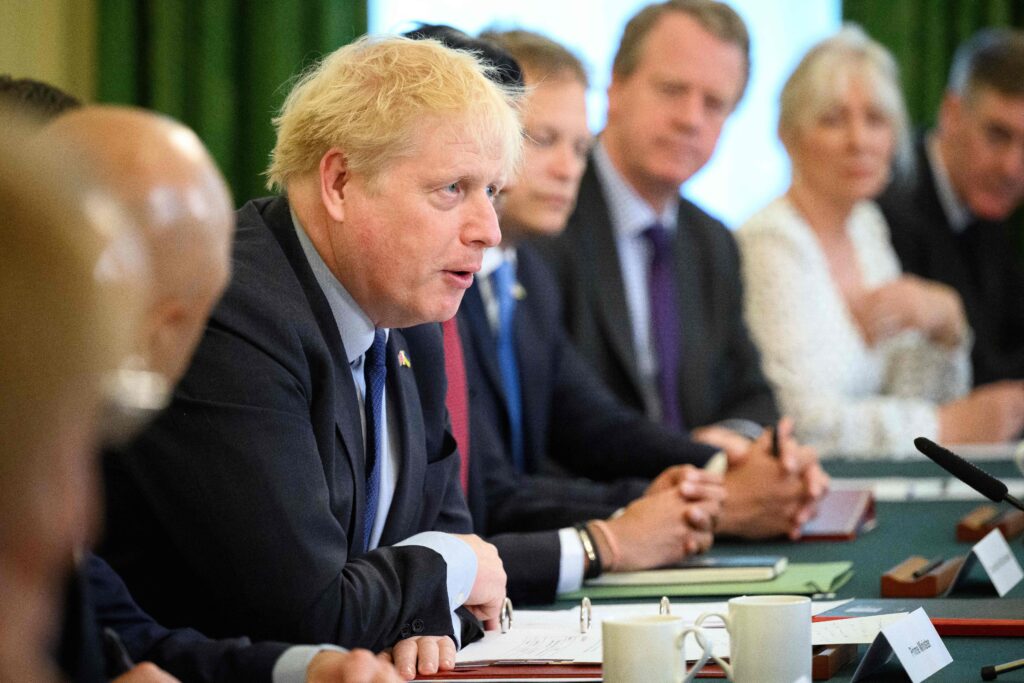Tories reignite trans culture war just days after Boris Johnson’s humiliating no-confidence vote

Health secretary Sajid Javid has once again taken aim at trans people. (Carl Court/Getty Images)
The Conservative Party have once again reignited its culture war against trans rights conveniently days after Boris Johnson’s no-confidence vote.
Only two days after a wounded Johnson survived a tense no-confidence vote, Sky News decided to quiz health secretary Sajid Javid on trans-inclusive language in healthcare.
NHS England updated its online health guidance for ovarian, womb and cervical cancers to include trans and non-binary people.
Javid said he does not agree with the move, arguing that “common sense” must be used when advising people on public health.
He said Wednesday morning (8 June): “I don’t think it’s right. You won’t be surprised to know as the health secretary I think your sex matters, your biological sex is really important so you get the right treatment, the very best treatment.”
Health Secretary Sajid Javid says 'it's important that words like women and men are used' in messaging about cancers, "so people know who you're talking about".#KayBurley https://t.co/3zmq8DU1kj
📺 Sky 501, Virgin 602, Freeview 233 and YouTube pic.twitter.com/JkEM2KLI7x
— Sky News (@SkyNews) June 8, 2022
“I can equally pick prostate cancer,” he told host Kay Burley, “which we know can only happen for those who are biologically male.
“It’s important that when messaging is given to people for cancers … that words like women and men are used so people know who you are talking about and we can actually do something about it.”
Javid, who once claimed without evidence that gender-neutral language can cost lives, added he is “looking into” whether to get the wording reversed. “I think I’ve made my views clear on this,” he said.
Saying ovarian cancer is a “silent killer”, Burley said that “confusing” gender-neutral language is “not going to help”.
Target Ovarian Cancer, a UK charity, stresses that ovarian cancer should not be described as a “silent killer”. Doing so, it says, only deepens the lack of awareness around the disease and suggests there aren’t any early symptoms.
Javid claimed that “there are women who do not know always that when you’re talking about cervixes and things that you are actually talking about women”.
“I know there is some sensitivity around this language but we have to use our common sense so that we can give people the best possible patient care,” he added.
The nhs.uk web page for ovarian cancer now lists the disease as a “cancer that’s found anywhere in the cervix”. “Anyone with ovaries can get ovarian cancer,” it adds.
While on womb cancer, the page notes: “Anyone with a womb can get womb cancer. This includes women, trans men, non-binary people and intersex people with a womb.”
Acknowledging that not all cis women have a womb, the page adds: “You cannot get womb cancer if you’ve had surgery to remove your womb (hysterectomy).”
“Cervical cancer is a cancer that’s found anywhere in the cervix,” the NHS guidelines on the disease say, before clearly outlining what a cervix is.
The NHS even published resources for pregnant trans and non-binary people this month after being accused of “blocking” the advice for no reason other than transphobia.

Boris Johnson’s government has increasingly taken aim at trans rights amid the scandals seizing them. (LEON NEAL/POOL/AFP via Getty Images)
Discrimination in healthcare, after all, can discourage trans people from selling help. A report from the campaign group TransActual UK found that nearly half of GPs don’t have a good understanding of trans healthcare needs.
Six in 10 trans people would avoid seeking medical help altogether.
For trans youth charity Mermaids, this shows just how life-saving trans-inclusive language in healthcare can be,
“Trans and non-binary communities are disproportionately negatively impacted by healthcare inequalities and discriminatory behaviour within the healthcare system,” Mermaids said in a statement to PinkNews.
“The assumption that all NHS patients adhere to a strict gender binary has led to those with gender-diverse identities being excluded from vital medical information around maternity, smear tests, cancer treatment and more.
“The use of trans-inclusive language within the NHS is an important step in addressing the barriers many trans people face in accessing healthcare, and any suggestion otherwise is exclusionary, harmful and only serves to exacerbate an increasingly toxic social and political landscape geared towards further ostracising our community.”
The London Transgender Clinic agreed. “Although we believe accuracy in biological and medical terms is important in official resources such as on the NHS website, as a trans-focussed clinic, we believe an inclusive language is fundamental in reaching as many members of the population as possible,” the clinic said.
Seemingly pulling a page out of the Republican playbook, the Tories have increasingly used trans rights as a way to deflect from their failings.
As backlash reached a new peak about the Tories’ lockdown-breaking parties in April, Johnson thought now was the time to say trans women should not compete in sports.
When Labour leader Keir Starter grilled Johnson about the cost of living crisis during Prime Minister’s Question in May, he replied with a mocking remark against trans women.
This is all despite the fact that many Brits simply don’t agree with the Tories anti-trans stance. The majority of Brits support trans rights, several polls have found, and a Stonewall survey released in June found that the public admires trans people above all LGBTQ+ folk.

